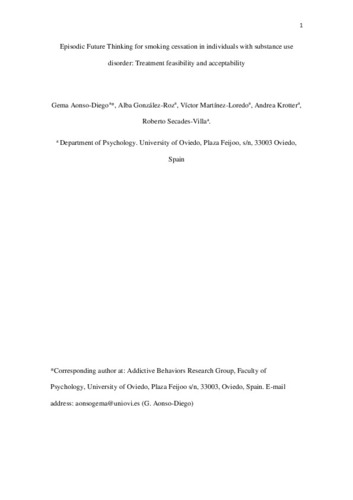Episodic future thinking for smoking cessation in individuals with substance use disorder: treatment feasibility and acceptability
Autor(es) y otros:
Palabra(s) clave:
smoking cessation
episodic future thinking
substance use disorder
delay discounting
Fecha de publicación:
Versión del editor:
Citación:
Resumen:
Background. Smokers with substance use disorders (SUD) smoke approximately four times more than the general population. Current efforts are focused on improving smoking cessation treatments for this population. Episodic future thinking (EFT), a novel intervention aimed at decreasing impulsive choice, has shown promising results for reducing cigarette demand in experimental settings. This feasibility study sought to examine the feasibility and preliminary EFT effects on delay discounting (DD) and nicotine intake reductions throughout treatment. Method. Smokers in substance use treatment (N=29; 75.9% males) received an 8-week cognitive-behavioral treatment (CBT)+EFT for smoking cessation. Feasibility was assessed through successful recruitment rates, retention, and adherence to treatment. Acceptability was measured as participants’ satisfaction. Non-parametric range tests were computed to analyze changes in continuous variables. Results. Among interested individuals, 42 (43.75%) met the inclusion criteria, and 29 entered the treatment program. Rate of treatment completion was 65.5% (19/29). Mean (SD) sessions attended were 7(1.11), and mean patient satisfaction rating with treatment was 8.83/10. Low compliance with EFT was observed, with 15.8% (3/19) of patients practicing at least 50% of the requested times. Conclusions. CBT+EFT is acceptable for the SUD population. However, some adjustments should be implemented to improve the adherence and feasibility of EFT, such as reducing the number of practices and temporal intervals in EFT events. Given the low sample size, and the absence of a control group, future larger scale trials are needed to elucidate EFT effects on DD and smoking cessation.
Background. Smokers with substance use disorders (SUD) smoke approximately four times more than the general population. Current efforts are focused on improving smoking cessation treatments for this population. Episodic future thinking (EFT), a novel intervention aimed at decreasing impulsive choice, has shown promising results for reducing cigarette demand in experimental settings. This feasibility study sought to examine the feasibility and preliminary EFT effects on delay discounting (DD) and nicotine intake reductions throughout treatment. Method. Smokers in substance use treatment (N=29; 75.9% males) received an 8-week cognitive-behavioral treatment (CBT)+EFT for smoking cessation. Feasibility was assessed through successful recruitment rates, retention, and adherence to treatment. Acceptability was measured as participants’ satisfaction. Non-parametric range tests were computed to analyze changes in continuous variables. Results. Among interested individuals, 42 (43.75%) met the inclusion criteria, and 29 entered the treatment program. Rate of treatment completion was 65.5% (19/29). Mean (SD) sessions attended were 7(1.11), and mean patient satisfaction rating with treatment was 8.83/10. Low compliance with EFT was observed, with 15.8% (3/19) of patients practicing at least 50% of the requested times. Conclusions. CBT+EFT is acceptable for the SUD population. However, some adjustments should be implemented to improve the adherence and feasibility of EFT, such as reducing the number of practices and temporal intervals in EFT events. Given the low sample size, and the absence of a control group, future larger scale trials are needed to elucidate EFT effects on DD and smoking cessation.
ISSN:
Patrocinado por:
This research was supported by the Spanish National Plan on Drugs (Ref. MSSSI-17-2017I036), a grant from the Council for Economy and Work of the Government of the Principality of Asturias (Ref. FC-GRUPIN-IDI/2018/000137) and by two Predoctoral Grants from the National Agency of Research of the Spanish Ministry of Science, Innovation and Universities (FPU17/00659 and BES-2016-076663).
Colecciones
- Artículos [37321]
- Investigaciones y Documentos OpenAIRE [8276]
- Psicología [1472]
Ficheros en el ítem





